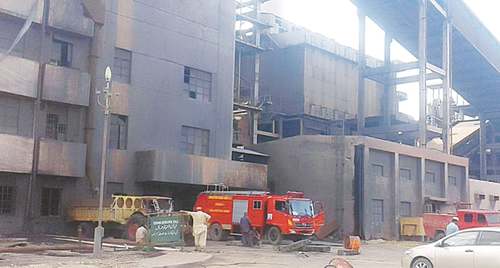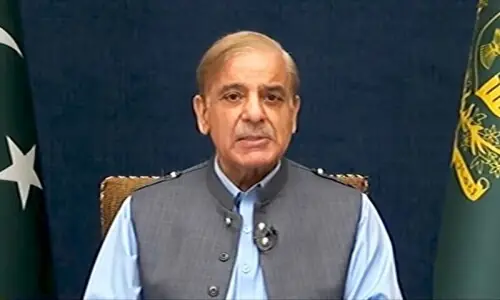• Dastgir and Wapda confirm Neelum-Jhelum power station closed due to cracks in tailrace tunnel
• Minister claims shortfall has shrunk; says govt will add 5,000MW to national grid this fiscal
• Says Afghan coal still cheaper than other options
ISLAMABAD: Amid countrywide electricity shortages, the 969-megawatt Neelum-Jhelum hydropower project, completed at an estimated approved cost of about Rs508bn, has been closed due to major cracks in its tailrace tunnel.
“Neelum-Jhelum is unfortunately offline. Details of its suspension or fault have not been concluded yet,” Power Minister Khurram Dastgir Khan confirmed at a presser, adding that thorough investigations were currently under way of all its channels, which are deep and long, some of them under huge mountains.
The project’s construction was taken in hand in 2002 after 21 years of delay and completed in April 2018 — again with repeated cost overruns and missed deadlines.
Major construction involving about 58 kilometres of tunnels was done by Chinese contractor CGGC-CMEC (Gezhouba Group), hired in December 2007.
Despite its installed capacity of 969MW, the project has often exceeded its production level, touching 1,040MW. It was providing more than five billion units of electricity, or kilowatt-hours (kWh), to the national grid a year at an average tariff of about Rs9 per unit at no fuel cost.
The Water and Power Development Authority (Wapda), which operates hydropower stations, later also confirmed that the project’s “tailrace tunnel has been blocked and as a result the power station has been closed for safety reasons”.
“The reasons for the closure of the tailrace tunnel are currently being investigated. Steps would be taken to remove the blockade of the tailrace once the reasons are known,” Wapda said in a statement issued in Urdu.
It said all relevant institutions had been informed of the closure of one of the country’s top hydropower plants through the Ministry of Water Resources.
Claims of lessening shortfall
The minister, however, said the power supply situation had improved as generation from Tarbela alone had increased by 2,500MW. He said the Tarbela power station had attained a power generation level of 3,684MW from just 1,125MW following the last five days of improved river inflows and the start of coal imports from Afghanistan.
As a result, there was about a 50pc drop in power shortfall of 4,000-5,000MW.
At the same time, electricity demand had also decreased because of improved weather, he said, adding that loadshedding would further drop during Eid days as the 1,100MW unit 2 of Karachi Nuclear Power Plant (K-2) would come on stream in a couple of days after a tedious refuelling process.
The minister said there had been major progress on coal imports from Afghanistan and the 1,320MW Sahiwal Coal Power Project had reached an agreement with a private Afghan entity for coal supplies as the governments in Islamabad and Kabul played the role of facilitators. He said three trains full of Afghan coal had already been delivered to the Sahiwal plant.
He said the details of the agreement were not known to the government but would be available once these are submitted to the National Electric Power Regulatory Authority (Nepra) for tariff approval.
Afghan coal
He confirmed that the Afghan government had increased duty on coal exports from $90 to $200 per tonne, but he insisted that it was still cheaper than imports from elsewhere as coal prices had gone beyond $400 per tonne from $90 a few months ago. Another advantage was that Pakistan was paying for Afghan coal in rupees, hence foreign exchange saving as well, he said.
He said a government delegation comprising senior officials would visit Kabul for discussions on how to permanently streamline coal supplies. He said Pakistan would request the interim Afghan government to ensure round-the-clock border operations to ensure uninterrupted coal supplies, particularly at night.
He said Afghanistan’s priority was the maximum clearance of their perishable items like fruits and vegetables in the daytime and coal operation could be handled throughout the night.
The minister declined to comment on some recent adverse comments from an Afghan minister, saying he would instead advocate that bilateral trade relations between neighbours were the best relationships for the people of all sides and improved linkages then put a positive impact on foreign relations.
Coal supply, he said, was a major transaction which had support from both governments. This is a business-to-business arrangement between independent power producers (IPPs) and Afghan coal suppliers. He said the Pakistani delegation would also raise the issue of a hike in export duties with Afghan authorities.
He said the 1,320MW China-Hubco Coal Power Plant was also in talks to procure Afghan coal and would soon be run on imported coal from next door.
The minister said Nepra had determined an increase of Rs7.91 per unit in the national electricity price through tariff rebasing and the Economic Coordination Committee of the cabinet had decided to implement it in three phases of Rs3.50 per unit in July and August each and 91 paise in October but the federal cabinet had not yet approved its implementation.
He said Punjab had already announced to pick the bill for those consuming fewer than 100 units of electricity per month for the last six months and the centre had also requested other provinces to follow suit to protect the poor.
He said the centre’s financial cushion was limited, but the provinces still had fiscal space to finance subsidies for poor consumers.
He said the tariff adjustments would take place, but rates would not be increased for lifeline consumers and massive subsidies would be given to them.
In reply to a query, the minister acknowledged the anticipatory approval of the prime minister for the base tariff increase but said it was done to challenge Nepra’s decision regarding rebasing of power tariff with a different sequencing.
The minister said the government would add another 5,000MW to the national grid system during the current fiscal year. These were all those projects that were started by the last PML-N government led by party supremo Nawaz Sharif, he said.
Beyond these projects, there would be no more capacity addition in future except in hydro, solar, wind, local coal and other domestic resources.
Published in Dawn, July 7th, 2022

































